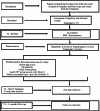The feasibility, acceptability and clinical impact of a guided self-help mobile intervention (INTERconNEcT-EDs) for individuals with eating disorders: protocol for two multicenter randomized controlled trials
- PMID: 40551261
- PMCID: PMC12183907
- DOI: 10.1186/s40337-025-01320-z
The feasibility, acceptability and clinical impact of a guided self-help mobile intervention (INTERconNEcT-EDs) for individuals with eating disorders: protocol for two multicenter randomized controlled trials
Abstract
Background: Treatments for eating disorders (EDs) are marked by high rates of relapses and can be ineffective for almost one in two people. It has been suggested that digital self-help might enhance treatment engagement, retention and efficacy in this patient group. A novel guided self-help mobile intervention (i.e. INTERconNEcT-EDs) to target psychological distress and eating psychopathology in young adults with ED symptoms has been developed. INTERconNEct-EDs is an online, eight-week, guided self-help (GSH) program based on an integrated approach which combines elements of psychoeducation, behaviour change and interpersonal therapy tailored to individual's interpersonal difficulties.
Methods: Two randomized controlled trials (RCTs) will be conducted to examine the acceptability, feasibility and impact of INTERconNEcT-EDs on a range of psychological outcomes of outpatients with eating disorders or people in the community with symptoms of disordered eating, in Italy. In the first RCT, 172 adult outpatients with EDs from two public clinical services will be recruited and randomised to treatment as usual (TAU) alone or TAU plus INTERconNEcT-EDs. The primary outcome will be patient psychological distress. Secondary outcomes will include eating disorder psychopathology, interpersonal distress, quality of life, motivation to adhere to standard treatment and INTERconNEcT-EDs, emotion dysregulation, and patient satisfaction, at end of the eight-week treatment and 3-month follow-up. In the second RCT, 70 adult individuals from the community with symptoms of disordered eating (measured by a self-report) will be randomised to receiving INTERconNEcT-EDs or a waiting list condition. The primary and secondary outcomes are identical to those of the first RCT. Moreover, participant's service use will be recorded at the end of the eight-week protocol. INTERconNEcT-EDs consists of psychoeducational workbooks, video-clips, weekly themed, and synchronous forum groups facilitated by individuals recovered from an ED. Participants randomised to TAU + INTERconNEcT-EDs in the first trial will also receive weekly online interpersonal group sessions. Group sessions will be tailored to target individual's interpersonal difficulties, as measured by the Inventory of Interpersonal Problems at baseline.
Discussion: The results of this study will determine the feasibility and clinical impact of a novel eating disorder transdiagnostic self-help intervention with the potential of broad reach and scalability.
Trial registration: ClinicalTrials.gov Identifier NCT06551974.
Keywords: Disordered eating; Eating disorders; Group treatment; Guided self-help; Interpersonal therapy; Online intervention; Peer mentoring; Personalization; Task-sharing.
© 2025. The Author(s).
Conflict of interest statement
Declarations. Ethics approval and consent to participate: The Ethics’ Committee of the Catanzaro Region has granted ethical approval to the study (protocol number 221 27.06.2024). Study psychiatrists will discuss informed consent in detail with potential participants, including a discussion of any questions/concerns regarding the study. Participants will commence study participation once written informed consent is obtained. Both prior to signing the consent form, and on the form itself, it will be made clear to potential participants that entry into the study is voluntary and if they opt not to participate this will in no way affect their relationship with the hospital or study investigators/clinicians. Consent for publication: N/A. Competing interests: The authors declare no competing interests. Confidentiality: To ensure confidentiality, all data collected will be pseudonymized. The digital platform is validated according to GMP Annex 11 and FDA CFR 21 Part 11 and compliant with GDPR. Research data will only be accessible to staff involved in the study as needed. Where participant consent is provided for data to be re used and shared with other researchers for future research projects, data will only be provided in a de-identified format and with separate ethics approval.
Similar articles
-
Interventions for preventing eating disorders in children and adolescents.Cochrane Database Syst Rev. 2002;2002(2):CD002891. doi: 10.1002/14651858.CD002891. Cochrane Database Syst Rev. 2002. PMID: 12076457 Free PMC article.
-
Does interdisciplinary group care for the treatment of endometriosis improve pain interference: protocol for a pilot randomised controlled trial at an urban academic medical centre.BMJ Open. 2025 Mar 5;15(3):e097372. doi: 10.1136/bmjopen-2024-097372. BMJ Open. 2025. PMID: 40044193 Free PMC article.
-
Incentives for preventing smoking in children and adolescents.Cochrane Database Syst Rev. 2017 Jun 6;6(6):CD008645. doi: 10.1002/14651858.CD008645.pub3. Cochrane Database Syst Rev. 2017. PMID: 28585288 Free PMC article.
-
Psychological therapies for treatment-resistant depression in adults.Cochrane Database Syst Rev. 2018 May 14;5(5):CD010558. doi: 10.1002/14651858.CD010558.pub2. Cochrane Database Syst Rev. 2018. PMID: 29761488 Free PMC article.
-
Algorithm-based pain management for people with dementia in nursing homes.Cochrane Database Syst Rev. 2022 Apr 1;4(4):CD013339. doi: 10.1002/14651858.CD013339.pub2. Cochrane Database Syst Rev. 2022. PMID: 35363380 Free PMC article.
References
-
- Crone C, Fochtmann LJ, Attia E, Boland R, Escobar J, Fornari V, et al. The American psychiatric association practice guideline for the treatment of patients with eating disorders. Am J Psychiatry. 2023;180(2):167–71. 10.1176/appi.ajp.23180001. - PubMed
-
- Erhart M, Herpertz-Dahlmann B, Wille N, Sawitzky-Rose B, Hölling H, Ravens-Sieberer U. Examining the relationship between attention-deficit/hyperactivity disorder and overweight in children and adolescents. Eur Child Adolesc Psychiatry. 2012;21(1):39–49. 10.1007/s00787-011-0230-0. - PubMed
-
- Arcelus J, Haslam M, Farrow C, Meyer C. The role of interpersonal functioning in the maintenance of eating psychopathology: A systematic review and testable model. Clin Psychol Rev. 2013;33:156–67. 10.1016/j.cpr.2012.10.009. - PubMed
-
- Rieger E, Van Buren DJ, Bishop M, Tanofsky-Kraff M, Welch R, Wilfley DE. An eating disorder-specific model of interpersonal psychotherapy (IPT-ED): causal pathways and treatment implications. Clin Psychol Rev. 2010;30(4):400–10. 10.1016/j.cpr.2010.02.001. - PubMed
Associated data
Grants and funding
LinkOut - more resources
Full Text Sources
Medical


